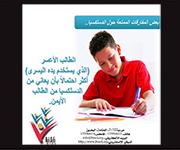|
||||||||
|
||||||||
معاً نأخذ بيد أطفال الدسلكسيا "عسر القراءة المحدّدة"..
أمي.. أبي.. لا تيأسوا أبداً من تعليمي، فإن غرسكما سيثمر يوما ما.. فأنا استطعت أن أحرز نتائج ممتازة بعدما اعتنى بتعليمي المختصّون.. فاصبروا معي صبراً جميلا.. |
||||||||
|
||||||||
|
|||||||||
| Youtube Video Gallery | Latest News | Instagram Photo Gallery | |||||||||||||||||
|
|
|
|||||||||||||||||
Contact us Tel: +973- 17556613
|
Dyslexia ADHD Early Diagnosise Consultancy F.A.Q Useful Websites Students Work Testimonials Photo Gallery Video Gallery |
Home About us Mission Services News Articles Publications Contact us |
|||||
| All rights © reserved for BISE - Bahrain 2014 2022 | |||||||












